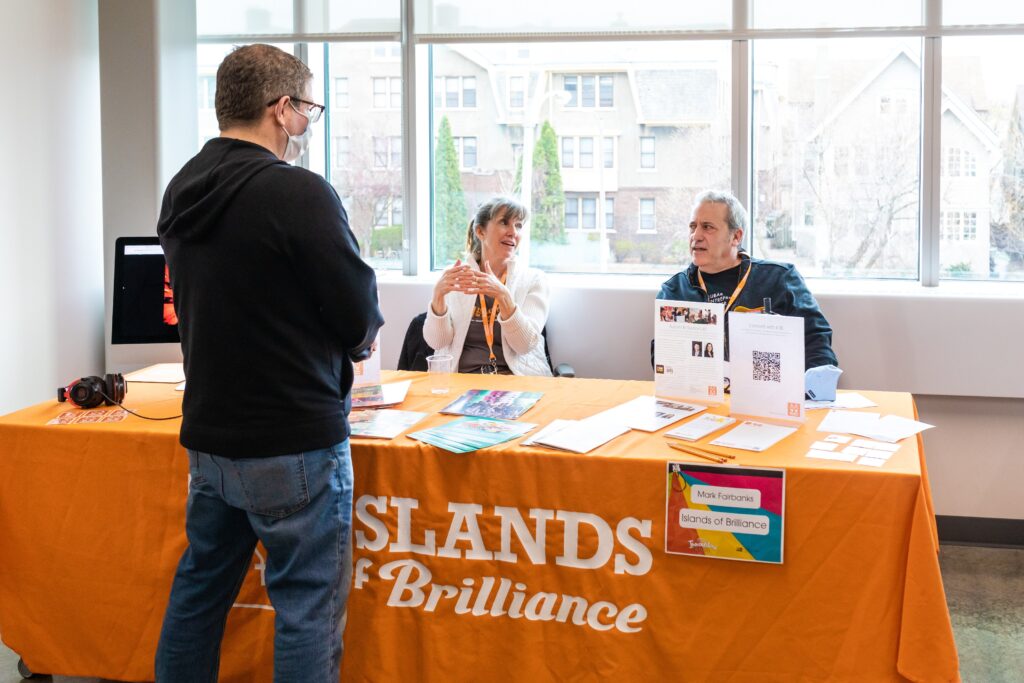
Over this past summer, the LEC hosted Islands of Brilliance (IOB), an organization co-Founded by Mark Fairbanks and Margaret Fairbanks to provide learning experiences for individuals on the autism spectrum. IOB received a NEA Research Lab award from the National Endowment for the Arts earlier this year to support ABLE: The Autism Brilliance Lab for Entrepreneurship. We spoke with Margaret, Co-Founder of IoB and leader of the Foundations program this summer, about her experiences and what she has learned.
Please give us an introduction to who you are and what Islands of Brilliance is.
Margaret: “Hello! I am Margaret Fairbanks. I am one of the co-Founders and the Chief Education Officer at a program called Islands of Brilliance. Islands of Brilliance uses art, creativity, and technology to foster self-confidence and self-advocacy for the autistic community. Quite often there are programs that are ‘guardrail’ programs: grab a buddy and do something a neurotypical person would do, but not programs that are specifically designed for what we knew, in our personal experience raising Harry, was of interest to him. For example, you can do karate, but you have to bring a buddy; and that means karate has to interest Harry. Well, Harry was into his own thing. Harry was into technology, and he did his best when he had one-to-one support. The idea behind creating Islands was using that area of interest – many individuals on the autism spectrum have one area of passion – and rather than extinct it, which is typically done, we embraced it. When Harry was in his area of interest, his communication increased, his focus increased, his ability to do things just went up exponentially – so why not create a program that’s like that? We see kids walk out and they’re a couple inches taller when they leave our program because they are valued, heard, and their interests are recognized.”
Over the summer, you held your Foundations program at the LEC. What are the specifics of this program?
Margaret: “In about 2018, after six years of seeing tremendous growth and success and having our first few employees, we started expanding our programming. What we saw was that there is a severe underappreciation and undervaluation of the intellectual disabilities population. The unemployment rate for adults with autism – even those with a degree – is staggering. We’re looking at about 83% unemployment. That’s shocking. That has to change. And when you think about how many people are struggling to find employees right now, we’re at a perfect time to start addressing those needs. The challenge is, we always want to change that individual with a disability. As opposed to seeing their capabilities and reframing our process, we expect that one individual to be the one who turns themself from a round cog to a square cog. Our goal is not only to prepare that individual, but to prepare society. How do we prepare the community? How do we prepare the workforce to say that this method that works with 80% of the people might not work with the 20%, but I need that 20%. Everybody’s got to learn – it can’t just be on that individual. So, we’ll have this project, and we’ll ask you to step two feet away from your comfort zone. It’s a group project, so you’ll have to work as a team, take some critical feedback, work under a higher level of rigor, decreased support, and ideally start scaffolding what it will be like to be in the workforce. The idea is, how do we start inviting these really cool learning opportunities but also prepare these individuals to understand how they learn best and push them to understand.”
What learning experiences have you gained from Foundations, and how has the program changed over time because of them?
Margaret: “Even though we invented Foundations, I still sometimes underestimate how amazing our students can be. And I’m the one who tells people, ‘Don’t ever underestimate anybody!’ I still get blown away, and I think that’s really the beauty of it. You never know when that magic moment is going to happen, you never know when that student is ready. We keep saying, ‘We don’t push. We invite.’ That’s the difference. You invite somebody to try something new and they might not be ready, but you keep that door open – someday they’ll be ready.”
What do you feel is the students’ number one takeaway from Foundations?
Margaret: “I think they are just amazed that we accept them for what they are. What shocks me is I forget how negative an experience some learning environments can be for neurodiverse individuals. ‘Sit down. Shut up. Don’t open your mouth. Stop squirming. Why can’t you obey the rules? What’s wrong with you?’ As opposed to: ‘How can I create an environment where you feel welcome?’ They always feel like something is wrong with them, like they are less than. What does that do day after day after day? So, when you walk into an environment where ‘Hey, you need to hang out and fidget? You need to take a break? Awesome!’ When they aren’t questioned, when who they are, and their passions are welcomed and not stifled – that had never happened before. Having a place where they feel, ‘This is my place. I don’t have to change who I am. I am welcome here,’ that’s why kids keep coming back.”